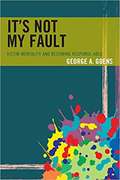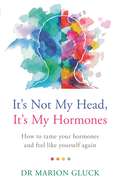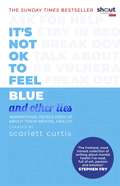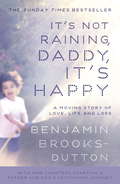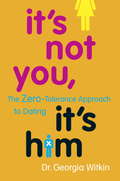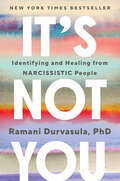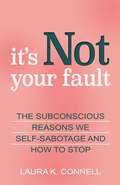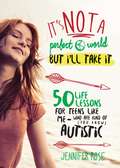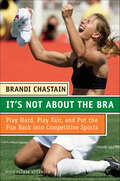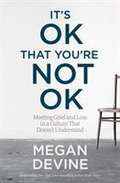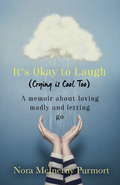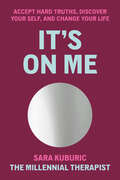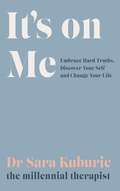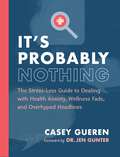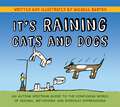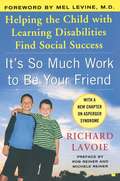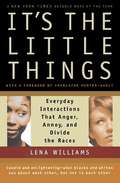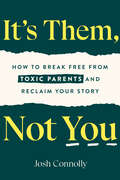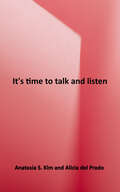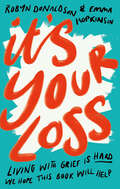- Table View
- List View
It's Not My Fault: Victim Mentality and Becoming Response-able
by George A. GoensAll children have hopes and dreams. Their innocent optimism from their early years to working their way through school is inspiring. The responsibilities of educators and parents are to help children be ‘response-able’ in facing the challenges of life. A victim mentality eliminates any hope of successfully meeting their aspirations and dreams. <p><p> Children face obstacles -- some are daunting and others the normal ups and downs of childhood. Parents and others have an obligation to help children grow into maturity and learn that they can act in positive ways in good as well as in hard times. To reject the ability to live a life they have imagined results in a life lost, along with its potential and possibilities. <p><p> To be successful, children cannot adopt a victim mentality. When confronted with challenges, character matters -- responding effectively to address life’s challenges. Schools must teach character development in an environment that holds children responsible and accountable. We all have only one life to live and we are able to respond to achieve an imagined life.
It's Not My Head, It's My Hormones: How to tame your hormones and feel like yourself again
by Dr Marion Gluck"Knowledge is power! We can't all be doctors, but we can all understand our hormone health. This is a practical and inspirational book dedicated to helping women be their mental and physical best at any age." Jeanette WintersonWhat if you're not actually going crazy?What if you don't need antidepressants after all?What if it's not your head, but your hormones?When your hormones are out of control, you lose control, and it can feel like you've turned into someone else entirely. Women's hormonal issues are routinely misdiagnosed and misunderstood by their doctors, but the lucky ones find their way to Dr Marion Gluck's clinic where she empowers them with her unique knowledge on how to take back control of their bodies and minds.With her expert advice from puberty to post-menopause, let Dr Gluck show you how hormones can become your allies in optimising your mental health and physical wellbeing. It's time to feel like yourself again.Dr Marion Gluck is world-renowned as a pioneer in the use of bio-identical hormones for women. She has over 30 years' experience working as a medical doctor with women all around the world. Based in London, she now trains doctors internationally on this life-changing treatment.
It's Not My Head, It's My Hormones: How to tame your hormones and feel like yourself again
by Marion Gluck"Knowledge is power! We can't all be doctors, but we can all understand our hormone health. This is a practical and inspirational book dedicated to helping women be their mental and physical best at any age." Jeanette WintersonWhat if you're not actually going crazy?What if you don't need antidepressants after all?What if it's not your head, but your hormones?When your hormones are out of control, you lose control, and it can feel like you've turned into someone else entirely. Women's hormonal issues are routinely misdiagnosed and misunderstood by their doctors, but the lucky ones find their way to Dr Marion Gluck's clinic where she empowers them with her unique knowledge on how to take back control of their bodies and minds.With her expert advice from puberty to post-menopause, let Dr Gluck show you how hormones can become your allies in optimising your mental health and physical wellbeing. It's time to feel like yourself again.Dr Marion Gluck is world-renowned as a pioneer in the use of bio-identical hormones for women. She has over 30 years' experience working as a medical doctor with women all around the world. Based in London, she now trains doctors internationally on this life-changing treatment.
It's Not OK to Feel Blue: Inspirational people open up about their mental health (And Other Lies)
by Scarlett Curtis'This is the freshest, most honest collection of writings about mental health that I've read...searing wit, blinding passion, bleeding emotion and a fantastic, heroic, glorious refusal to lie down and take it' - Stephen Fry'Reading this book made me feel more normal about the things I feel sometimes...It's a great book; however you're feeling, it'll help' - Ed Sheeran'This is the book I needed when I was little. May this be a leap forward in the much needed conversation around mental health' - Jameela Jamil Everyone has a mental health. So we asked:What does yours mean to you? THE RESULT IS EXTRAORDINARY.Over 60 people have shared their stories. Powerful, funny, moving, this book is here to tell you:It's OK.With writing from: Adam Kay - Alastair Campbell - Alexis Caught - Ben Platt - Bryony Gordon - Candice Carty-Williams - Charlie Mackesy - Charly Cox - Chidera Eggerue - Claire Stancliffe - Davina McCall - Dawn O'Porter - Elizabeth Day - Elizabeth Uviebinené - Ella Purnell - Emilia Clarke - Emma Thompson - Eve Delaney - Fearne Cotton - Gabby Edlin - Gemma Styles - GIRLI (Milly Toomey) - Grace Beverley - Hannah Witton - Honey Ross - Hussain Manawer - Jack Rooke - James Blake - Jamie Flook - Jamie Windust - Jessie Cave - Jo Irwin - Jonah Freud - Jonny Benjamin - Jordan Stephens - Kai-Isaiah Jamal - Kate Weinberg - Kelechi Okafor - Khalil Aldabbas - KUCHENGA - Lauren Mahon - Lena Dunham - Maggie Matic - Martha Lane Fox - Mathew Kollamkulam - Matt Haig - Megan Crabbe - Michael Kitching - Michelle Elman - Miranda Hart - Mitch Price - Mona Chalabi - Montana Brown - Nadia Craddock - Naomi Campbell - Poorna Bell - Poppy Jamie - Reggie Yates - Ripley Parker - Robert Kazandjian - Rosa Mercuriadis - Saba Asif - Sam Smith - Scarlett Curtis - Scarlett Moffatt - Scottee - Sharon Chalkin Feldstein - Shonagh Marie - Simon Amstell - Steve Ali - Tanya Byron - Travon Free - Yomi Adegoke - Yusuf Al Majarhi
It's Not Raining, Daddy, It's Happy
by Benjamin Brooks-DuttonBen Brooks-Dutton's wife - the great love of his life - was knocked down and killed by a car as he walked beside her, pushing their two-year-old son in his buggy. Life changed forever. Suddenly Ben was a widower deep in shock, left to raise their bewildered child alone. In the aftermath Ben searched for guidance from men in similar situations, but it appeared that young widowed fathers don't talk. Well-meaning loved ones admired his strength. The unwritten rule seemed to be to 'shut up, man up and hide your pain'. Lost, broken and afraid of the future, two months after his wife Desreen's death, Ben started a blog with the aim of rejecting outdated conventions of grief and instead opening up about his experiences. Within months Life as a Widower, had received a million hits and had started an all-too-often hushed conversation about the reality of loss and grief. This is the story of a man and a child who lost the woman they so dearly love and what happened in the year that followed. Ben describes the conflicting emotions that come from facing grief head on. He rages against the clich?s used around loss and shows the strange and cruel ways in which grief can take hold. He also charts what it means to become a sole parent to a child who has lost their mother and cannot yet understand the meaning of death. Through the shock and sadness shine moments of hope and insight. So much of what Ben learns comes from watching his son struggle, survive and live, as children do, from moment to moment where hurt can turn to happiness and anger can turn to joy. This is a story of loss, heartbreak and courage. At its heart is the funny, infuriating and life affirming relationship between a father and son and their ongoing love for an extraordinary woman.
It's Not You, It's Him
by Georgia WitkinYou're smart and cute and fun to be around. So naturally you wonder why you're still single. Well, here's a news flash: It's Not You, It's Him!This book will make dating fun again--and help you find the love you always dreamed of"Why is this book for single women? Because we think about relationships, and talk about relationships, much more than single men do. And when things go wrong, we're also much more likely to blame ourselves! We ask ourselves, "What's wrong with me?" "What did I do?" "What should I have done differently?" Well, maybe, just maybe you are not the problem. Maybe, just maybe, you'd still be single even if you were perfect. Maybe the men you're meeting have the problems. Maybe it's not you, it's him!Actually, there's no maybe about it. Your aunt in Florida, your married brother, and your gym friends are wrong--you are not single because you're too picky, too pushy, or a princess. Besides, even if you were, picky, pushy princesses get married every day. And so will you. So let's get real and get you the life you want." --Dr. Georgia Witkin, from...It's Not You, It's Him In her upbeat new "rules" for finding lasting love, Dr. Georgia Witkin shows that the secret to dating without all the pain is to assume that you are perfectly lovable exactly as you are. When a good date goes bad, the problem is never you. It's him!Suddenly dating is so simple. You will never again ask "why didn't he call?" It doesn't matter. You will never ask, "How should I change?" You don't have to. Instead you will do what you want, go where you want, wear what you want, and it will only make you more perfect. You will take everything dates say and do as information about them--not you. You will have zero tolerance when you're getting zero. You will feel happy, in control, and actually enjoy dating again. And before too long, the new you will fall wildly in love with a man who is just perfect enough to find you irresistible.
It's Not You, It's the Dishes (originally published as Spousonomics)
by Paula Szuchman Jenny AndersonYour marriage is fine, right? Sure, there are showdowns over who unloads more dishes, and some simmering discontent over who drives more car pools, cleans more dust bunnies, and keeps the social wheels of your existence greased. The sex is good, though you can't remember when you last had it. Come to think of it, you're plagued by a nagging sense that marriage used to be so much more fun. Marriage can be a mysterious, often irrational business. But the key, propose Paula Szuchman and Jenny Anderson in this incomparable and engaging book, is to think like an economist. We all have limited time, money, and energy, but we must allocate these resources efficiently. It's Not You, It's the Dishes is a clear-eyed, rational route to demystifying your disagreements and improving your relationship. Smart, funny, deeply researched, and refreshingly realistic, It's Not You, It's the Dishes cuts through the noise of emotions, egos, and tired relationship clichés to solve the age-old riddle of a happy, healthy marriage. Originally published as SpousonomicsFrom the Trade Paperback edition.
It's Not You: Identifying and Healing from Narcissistic People
by Ramani Durvasula PhDINSTANT NEW YORK TIMES BESTSELLERFrom clinical psychologist and expert in narcissistic relationships Dr. Ramani Durvasula, a guide to protecting and healing yourself from the daily harms of narcissismAN OPEN FIELD PUBLICATION FROM MARIA SHRIVERIt&’s not always easy to tell when you&’re dealing with a narcissistic person. One day they draw you in with their charm and charisma, the next they gaslight you, wreck your self-esteem, and leave you wondering, What should I have done differently? As Dr. Ramani explains in It&’s Not You, the answer is: absolutely nothing.Just as a tiger can&’t change its stripes, a narcissist will not stop manipulating and invalidating you, no matter how much you try to appease them. The first step toward healing from their toxic influence—and to protect yourself from future harm—is to accept that you are not to blame for their behavior.Drawing on more than two decades of studying the landscape of narcissism and working with survivors, Dr. Ramani explores how narcissists hijack our well-being and offers a healing path forward. Unpacking the oft-misunderstood personality, she reveals the telltale behavioral patterns that indicate you may be dealing with a narcissist. Along the way, you&’ll learn how to become gaslight resistant, chip away at the trauma bonds that keep you stuck in the cycle, grieve the loss of these painful relationships, create and maintain realistic boundaries, discern unhelpful behaviors from narcissistic behaviors, and recover your sense of self after constant invalidation.Thriving after, or even during, a narcissistic relationship can be challenging, but It&’s Not You shows you it is possible. Dr. Ramani invites you to stop blaming yourself and trying to change the narcissistic person, and to start giving yourself permission to let go of their hold on you and finally embrace your true self.
It's Not Your Fault: The Subconscious Reasons We Self-Sabotage and How to Stop
by Laura K. ConnellA guide to help readers uncover the subconscious reasons they hold themselves back along with an exploration of the ways negative childhood experiences have impacted their lives and fed into the problem.We are sometimes our own worst enemies, sabotaging our success and with it our chance for lasting happiness and opportunities for personal and professional fulfillment. It&’s Not Your Fault helps readers uncover the subconscious reasons they hold themselves back. These blind spots were often created in childhood as coping mechanisms in response to trauma. Rather than teaching tactics that ignore or give surface attention to adverse childhood events, the book lovingly guides readers to explore the ways these events have impacted their lives and how this knowledge will help them access true transformation. Readers will be relieved to discover that it's not a lack of willpower that has held them back, but a lack of self-knowledge instead. Those who have been let down by traditional therapeutic techniques know that behavior modification doesn&’t work for everyone. Simply doing things differently while staying the same on the inside might help for the short term, but before long old patterns emerge. Once they decide to get serious about change, however, and stop tweaking habits in the hope it will result in lasting transformation, they can create a life by design instead of default. It takes work, an internal excavation, and Laura comes alongside the reader as a trusted guide who has been where they are now. She provides the tools and anecdotal evidence to show them how to overcome the pain of self-sabotage and create the life they desire.
It's Not a Perfect World, but I'll Take It: 50 Life Lessons for Teens Like Me Who Are Kind of (You Know) Autistic
by Jennifer RoseJennifer Rose is autistic. She’s also a college student who loves reading, writes fan fiction, and wants to be on TV someday. She sees the world a little differently than most people around her. She’s had trouble coping with school and she’s struggled with bullies, mean girls, and her own feelings of bitterness and inferiority. Through it all, with the help of her parents, she’s learned a few lessons: #5: There are many ways to make a difference. #20: You won’t be perfect at everything, not even the things you do best. #22: Down times will be bouncing up soon . . . #23: . . . but meanwhile, try to enjoy what you have. #44: Talk about your feelings, even when it’s hard. #45: Learn to take jokes, even your dad’s. It's Not a Perfect World but I’ll Take It is an uplifting ode to being different. Told with irresistible honesty and humor, Rose’s fifty bite-sized stories will have teens and adults nodding in recognition and discovering new things about themselves.
It's Not about Food
by Normandi Carol EmeryA revised and updated edition of the longstanding guide that has helped thousands struggling with emotional eating disorders. Based on the techniques used successfully by Beyond Hunger, a nonprofit organization dedicated to helping people overcome emotional eating disorders, It's Not About Food gives readers the practical advice and inspirational push they need to take care of their bodies, minds, and hearts and put an end to the roller coaster of dieting and binging. This new edition includes updated statistics, a new section on the challenges of obesity, and a range of new personal accounts from eating disorder survivors and advice from the authors' recent Beyond Hunger workshops.
It's Not about the Bra: Play Hard, Play Fair, and Put the Fun Back into Competitive Sports
by Gloria Averbuch Brandi ChastainYouth sports aren't just about fun and games anymore. What should be a pleasurable experience is often marred by poor sportsmanship, trash talking, win-at-all-cost attitudes, and, in the worst cases, violence. But World Cup soccer champion and Olympic gold medalist Brandi Chastain has a solution. In It's Not About the Bra, Chastain draws on lessons learned in her phenomenal career and in her experience as a parent to illuminate "the beautiful game" and provide creative answers to the challenges that face young athletes and their parents.Chastain emphasizes the importance of developing leadership skills, finding (and becoming) role models, and giving back to one's team and community. She offers a blueprint for kids and parents alike on how to play fair, win (and lose) with grace, and, above all, have a good time doing it.
It's Ok That You're Not Ok: Meeting Grief And Loss In A Culture That Doesn't Understand
by Mark Nepo Megan DevineChallenging conventional wisdom on grief, a pioneering therapist offers a new resource for those experiencing loss When a painful loss or life-shattering event upends your world, here is the first thing to know: there is nothing wrong with grief. “Grief is simply love in its most wild and painful form,” says Megan Devine. “It is a natural and sane response to loss.” So, why does our culture treat grief like a disease to be cured as quickly as possible? In It’s OK That You’re Not OK, Megan Devine offers a profound new approach to both the experience of grief and the way we try to help others who have endured tragedy. Having experienced grief from both sides—as both a therapist and as a woman who witnessed the accidental drowning of her beloved partner—Megan writes with deep insight about the unspoken truths of loss, love, and healing. She debunks the culturally prescribed goal of returning to a normal, “happy” life, replacing it with a far healthier middle path, one that invites us to build a life alongside grief rather than seeking to overcome it. In this compelling and heartful book, you’ll learn: • Why well-meaning advice, therapy, and spiritual wisdom so often end up making it harder for people in grief • How challenging the myths of grief—doing away with stages, timetables, and unrealistic ideals about how grief should unfold—allows us to accept grief as a mystery to be honored instead of a problem to solve • Practical guidance for managing stress, improving sleep, and decreasing anxiety without trying to “fix” your pain • How to help the people you love—with essays to teach us the best skills, checklists, and suggestions for supporting and comforting others through the grieving process Many people who have suffered a loss feel judged, dismissed, and misunderstood by a culture that wants to “solve” grief. Megan writes, “Grief no more needs a solution than love needs a solution.” Through stories, research, life tips, and creative and mindfulness-based practices, she offers a unique guide through an experience we all must face—in our personal lives, in the lives of those we love, and in the wider world. It’s OK That You’re Not OK is a book for grieving people, those who love them, and all those seeking to love themselves—and each other—better.
It's Okay to Cry: A Parent's Guide to Helping Children Through the Losses of Life
by H. Norman WrightHelp Your Child Heal From Life's LossesA favorite toy breaks . . . . A pet dies . . . It's Okay to Cry.Parents divorce and you're forced to move . . . It's Okay to Cry.A best friend is hurt badly . . . . A grandparent dies . . .It's Okay to Cry.Look through the eyes of a child again. When something unexpected, disappointing, or traumatic occurs, children feel a very real sense of loss. They may respond with fear or with anger. Most likely they are confused. They have questions they want answered. They need help from their parents or others who care to understand and process their grief. It's Okay to Cry offers practical help for parents. It explains the symptoms of loss and unresolved grief so that parents can recognize them and walk alongside their children on the path to recovery.Well-known and respected author H. Norman Wright speaks to parents with sympathy and reassurance. He recognizes that most parents don't know how to teach their children to process loss, because often they weren't taught themselves. His sage advice will give you and your child the comfort and hope you seek.From the Trade Paperback edition.
It's Okay to Laugh (Crying is Cool Too): A memoir about loving madly and letting go
by Nora McInerny Purmort'Thank you for the perfect blend of nostalgia-drenched humour, wit, and heartbreak, Nora' Mandy Moore'This story will compel you to both laugh and cry, just as the title promises. May we all bring Nora's honesty, passion and hope to our lives' Lena Dunham'It is funny, and it is sad, and it is real, and if you've ever been through anything in your life . . . you are going to love this book' Jennifer Weiner, New York Times Bestselling author of Who Do You Lovecomedy = tragedy + time/roséTwenty-seven-year-old Nora McInerny Purmort bounced from boyfriend to dopey 'boyfriend' until she met Aaron - a charismatic art director and comic-book nerd who once made Nora laugh so hard she pulled a muscle. When Aaron was diagnosed with a rare form of brain cancer, they refused to let it limit their love. They got engaged on Aaron's hospital bed and had a baby boy while he was on chemo. In the period that followed, Nora and Aaron packed fifty years of marriage into the three they got, spending their time on what really matters: Buffy the Vampire Slayer, each other and Beyoncé. A few months later, Aaron died in Nora's arms. The obituary they wrote during Aaron's hospice care revealing his true identity as Spider-Man touched the nation. With It's Okay to Laugh, Nora puts a young, fresh twist on the subjects of mortality and resilience. What does it actually mean to live your 'one wild and precious life' to the fullest? How can a joyful marriage contain more sickness than health? How do you keep going when life kicks you in the junk? In this deeply felt and deeply funny memoir, Nora gives her readers a true gift - permission to struggle, permission to laugh, permission to tell the truth and know that everything will be okay. It's Okay to Laugh is a love letter to life, in all its messy glory; it reads like a conversation with a close friend and leaves a trail of glitter in its wake.
It's On Me: Accept Hard Truths, Discover Your Self, and Change Your Life
by Sara Kuburic&“A masterful guide to help all those who are building self-awareness.&”—yung pueblo, #1 New York Times bestselling author of LighterA revolutionary guide to identifying self-loss—that feeling of being adrift, disconnected from your true Self—and discovering the freedom that comes from taking responsibility for how we live and who we become, from an existential psychotherapist, USA Today columnist, and Instagram&’s popular &“Millennial Therapist&”So many of us feel lonely, unfulfilled, or trapped—in our roles and relationships, in cycles of self-sabotage and bad decisions, by our patterns and misguided attempts to feel happy or to feel something. According to existential psychotherapist Sara Kuburic, it doesn&’t have to be so difficult. Really.The answer is found in facing ourselves—whatever version that might be, regardless of whether we like the person we see reflected back to us. It&’s about accepting full responsibility for the choices and actions that create our reality. It&’s about finally taking ownership of this person we call our &“Self.&” It&’s about realizing that it&’s on us to figure out the two most essential questions: &“Who am I&” and &“Why am I here?&” and then to live accordingly.In It&’s on Me, Kuburic unpacks &“self-loss,&” giving us new vocabulary to understand this rarely talked about experience and offers tools she&’s used for years to help clients recover. Self-loss becomes apparent when we do not recognize ourselves in our actions, words, or relationships; when we lose sight of who we truly are, and feel the pain and emptiness from performing or observing life, rather than living it. Guiding us through her unique process of self-reflection, acceptance, and discovery, Kuburic proves that we can• experience but not feel overpowered by our emotions• establish a healthy connection to our bodies• set loving boundaries to define ourselves and heal our relationships• declutter our physical and mental environments to create space for our true Self to thrive• find meaning and purpose in a seemingly meaningless worldRevelatory and empowering, Kuburic shows how we can stop sleepwalking our way through the lives we don&’t want and step into our most vibrant, authentic, and meaningful Self. In doing so, we unlock a deep sense of connection to our innermost being, and to those around us.
It's On Me: Embrace Hard Truths, Discover Your Self and Change Your Life
by Sara KuburicHow to gain authenticity, freedom and responsibility by recovering your sense of identity.The fundamental belief I hold is that each individual is responsible for the way in which they engage with their own existence.How is it possible for us not to know who we are? If we are not ourselves, who are we? The truth is, we can become many things - a modified version of our true selves, a manifestation of our wounds, a projection of who others want us to be, or, in extreme circumstances, a stranger. In order to explain how this occurs, existential psychotherapist Sara Kuburic will introduce the listener to the concept of self-loss and explore how it manifests physically, emotionally, relationally and spiritually.Told through the lens of the author's own journey, the audiobook is divided into three parts: The Self I Lost, The Self I Found and, finally, The Self I Live.The listener will get a closer look at the behind the scenes of Kuburic's life and the numerous failed relationships, poor decisions, and over-achieving tendencies that are all rooted in her own self-loss. As she reflects on her own experiences, she will invite the reader to do the same.(P) 2023 Quercus Editions Limited
It's On Me: Embrace Hard Truths, Discover Your Self and Change Your Life
by Sara Kuburic'A Masterful guide' YUNG PUEBLO'If human beings came with a manual, It's On Me would be it' SIMON SINEKA revolutionary guide to identifying self-loss and discovering the freedom that comes from taking responsibility for how we live.So many of us feel lonely, unfulfilled, or trapped-in our roles and relationships, in cycles of self-sabotage and wrong decisions. According to Sara Kuburic, it doesn't have to be so difficult.The answer lies in taking responsibility for the choices and actions that create our reality. It's about slowing down, cutting through demands and expectations, and taking ownership of this person we call our "Self." In It's On Me, Kuburic unpacks "self-loss," giving us new vocabulary and offering tools she's used for years to help her clients recover. Self-loss becomes apparent when we feel the pain and emptiness from performing or observing life, rather than living it. Guiding us through self-reflection, acceptance, and discovery, Kuburic proves that we can: · experience but not feel overpowered by our emotions· establish a healthy connection to our bodies· set loving boundaries to define ourselves and heal our relationships· declutter our physical and mental environments to create space for our true selves to thrive· find meaning and purpose in a seemingly meaningless worldEye-opening and inspiring, It's On Me will teach you how to stop sleepwalking our way through the life you don't want and step into your most vibrant, authentic, and meaningful Self.
It's Probably Nothing: The Stress-Less Guide to Dealing with Health Anxiety, Wellness Fads, and Overhyped Headlines
by Casey GuerenFrom stress-induced symptom searching and "miracle cures" to the wellness fads filling your social media timeline, health journalist Casey Gueren digs into why we're so anxious about our health and how to separate medical facts from fiction. Surrounded by &“health hacks&” and clickbait headlines, it&’s easy to feel overwhelmed and underprepared when it comes to taking care of your health. But despite what the wellness industry told you, you don&’t need another cleanse, detox, or supplement—you need a crash course in separating hype from health.In It's Probably Nothing you&’ll find a health journalist&’s tools and tips to. . . Fine-tune your B.S. detector and spot the wellness industry&’s sneaky tricksGet answers to your health questions without spiraling down search holesManage health stress and learn to listen to your body (just enough)Decode the latest overhyped health headlinesFind compassionate, evidence-based care that works for youAnd so much more Packed with illuminating information, funny personal anecdotes, concrete strategies for coping, quotes from dozens of medical experts, and a foreword by New York Times-bestselling author of The Vagina Bible Dr. Jen Gunter, this book is the perfect companion for navigating our wellness-obsessed world with a little less stress and a lot more information.
It's Raining Cats and Dogs: An Autism Spectrum Guide to the Confusing World of Idioms, Metaphors and Everyday Expressions
by Michael Barton Delia BartonThe English language can be extremely confusing and illogical, especially for people with an autism spectrum disorder (ASD) who interpret meaning in a very literal way. Why should an announcement that cats and dogs are falling from the sky indicate heavy rain? And what have chickens got to do with being a coward? It's Raining Cats and Dogs is a witty and stylish insight into the mind of someone with an ASD. It beautifully illustrates why people with ASDs have problems understanding common phrases and idioms that others accept unquestioningly as part of everyday speech. The quirky drawings will entertain and inspire those on the spectrum, giving them the confidence to recognise figures of speech, feel less alienated and even use idioms themselves. The drawings will form instantly memorable references for those with ASDs to recall whenever they need to and will be helpful for anyone curious to understand the ASD way of thinking. They will enable people on the spectrum and their friends, families, teachers and colleagues to better understand and communicate with each other.
It's So Much Work to Be Your Friend: Helping the Child with Learning Disabilities Find Social Success
by Richard LavoieAs any parent, teacher, coach, or caregiver of a learning disabled child knows, every learning disability has a social component. The ADD child constantly interrupts conversations and doesn't follow directions. The child with visual-spatial issues loses his belongings and causes his siblings to be late to school. The child with paralinguistic difficulties appears stiff and wooden because she fails to gesture when she talks. These children are socially out of step with their classmates and peers, and often they are ridiculed or ostracized for their differences. A successful social life is immeasurably important to a child's happiness, health, and development, but until now, no book has provided practical, expert advice on helping learning disabled children achieve social success. For more than thirty years, Richard Lavoie has lived with and taught learning disabled children. His bestselling PBS videos, including How Difficult Can This Be?: The F.A.T. City Workshop, and his sellout lectures and workshops have made him one of the most popular and respected experts in the field. At last, Rick's pioneering techniques for helping children achieve a happy and successful social life are available in book form. It's So Much Work to Be Your Friend offers practical strategies to help learning disabled children ages six through seventeen navigate the treacherous social waters of their school, home, and community. Rick examines the special social issues surrounding a wide variety of learning disabilities, including ADD and other attentional disorders, anxiety, paralinguistics, visual-spatial disorders, and executive functioning. Then he provides proven methods and step-by-step instructions for helping the learning disabled child through almost any social situation, including choosing a friend, going on a playdate, conducting a conversation, reading body language, overcoming shyness and low self-esteem, keeping track of belongings, living with siblings, and adjusting to new settings and situations. Perhaps the most important component of this book is the author's compassion. It comes through on every page that Rick feels the intensity with which children long for friends and acceptance, the exasperation they can cause in others, and the joy they feel in social connection. It's So Much Work to Be Your Friend answers the most intense yet, until now, silent need of the parents, teachers, and caregivers of learning disabled children -- or anyone who is associated with a child who needs a friend.
It's The Little Things: Everyday Interactions That Anger, Annoy, And Divide The Races
by Charlayne Hunter-Gault Lena WilliamsNew York Times veteran Lena Williams candidly explores the everyday occurrences that strain racial relations, reaching a conclusion that "no one could disagree with" (The New York Times Book Review) <p><p> Although we no longer live in a legally segregated society, the division between blacks and whites never seems to go away. We work together, go to school together, and live near each other, but beneath it all there is a level of misunderstanding that breeds mistrust and a level of miscommunication that generates anger. Now in paperback, this is Lena Williams's honest look at the interactions between blacks and whites-the gestures, expressions, tones, and body language that keep us divided. <p> Frank, funny, and smart, It's the Little Things steps back from academia and takes a candid approach to race relations. Based on her own experiences as well as what she has learned from focus groups across the United States, Lena Williams does for race what Deborah Tannen did for gender. Finally, we have a book that traverses the color lines to help us understand, and eliminate, the alarmingly common interactions that get under the skin of both blacks and whites.
It's Them, Not You: How to Break Free from Toxic Parents and Reclaim Your Story
by Josh ConnollyA life-affirming manual on how to confront toxic family dynamics and find emotional freedom from your past.How many times have you heard that family is sacred, even when your reality is different? Resilience and well-being coach Josh Connolly knows statements like &“You&’ll miss them when they&’re gone&” or &“Blood is thicker than water&” doesn&’t apply to everyone. With candor and compassion, he tackles the harsh reality of toxic family dynamics and provides the tools you need to deal with emotionally immature parents It's Them, Not You helps you get unstuck and overcome past trauma, with: A deeply validating breakdown of how toxic parents operate and empowering tips to set clear boundaries that stick A step-by-step recovery process that combines breathwork with inner child healing and other therapeutic methodologies. Exercises and journaling prompts that support cognitive and emotional healing with deep reflection and self-compassion. Links to videos for guided conscious breathwork sessions to reconnect the mind and body and release stuck trauma safely. Whether your solution is to go &“no contact,&” place new boundaries, or reconnect with community, this book is the ultimate handbook to reclaim your agency and freedom.
It's Time To Talk (and Listen): How to Have Constructive Conversations about Race, Class, Sexuality, Ability and Gender in a Polarized World
by Anatasia S. Kim Alicia Del PradoConversations about controversial topics can be difficult, painful, and emotionally charged. This user-friendly guide will help you engage in effective, compassionate discussions with family, friends, colleagues, and even strangers about race, immigration, gender, marriage equality, sexism, marginalization, and more. <p><p>We talk every day—and we often do it without thinking. But, as you well know, there are some things that are harder to talk about—especially issues pertaining to politics, culture, lifestyle, and diversity. If you’ve ever struggled in a conversation about a “controversial” topic with a loved one, work colleague, or even a stranger, you know exactly how uncomfortable and heated the discussion can become. And even if you are one of the lucky few that expresses themselves eloquently, how do you move beyond mere “lip service” and turn words into actionable change? <p><p>This groundbreaking book will show you how to get to that important next level in difficult conversations, to talk in an authentic and straightforward way about culture and diversity, and to speak from the heart with tools from the head. Using a simple eight-step approach, you’ll learn communication strategies that are supported by research and have been practiced in classrooms, work meetings, therapy sessions, and more. <p><p>We constantly hear about friends and colleagues whose family members are not speaking to each other because of different political opinions, who’ve exchanged words that have mutually offended one another. If silence is one end of the continuum and verbal conflict anchors the other, how do we reach a middle ground? How do we take part in the “in between” spaces where both parties can speak and listen? <p><p>With this book as your guide, you’ll learn to navigate these difficult conversations, and take what you’ve learned beyond the conversation and out into the world—whether it’s through politics, social justice movements, or simply expanding the minds of those around you.
It's Your Loss: Living With Grief Is Hard. We Hope This Book Will Help.
by Emma Hopkinson Robyn DonaldsonGo on a journey of exploring the different approaches to grieving loss and discover the one that&’s right for youWritten by two women who experienced loss at a young age, this incredible grieving book will help you navigate any kind of loss, whether it&’s the death of a loved one, the end of a relationship or the loss of your job.Living with grief is hard. Let It's Your Loss help you find your new normal. It includes: • 10 chapters that focus on a different step of the journey through loss. • Topics reviewed by each of the authors in turn — one taking a more thoughtful, introverted approach, the other more practical and extroverted. • Five-minute fixes offer quick-and-easy practical coping suggestions. • Professional grief advice anchors the topics in sound psychological principle. Losing something or someone can be devastatingly painful, with far-reaching effects. But, loss is a natural part of life, one we all go through. This grief recovery handbook shows you how to recognize your grief and loss, take the time to sit with it, look at it and ultimately understand your reaction to it. Authors Emma Hopkinson and Robyn Donaldson believe that there is no right or wrong way to cope with loss. In this book about grief, they explore their own natural inclination to either keep their feelings in (Emma) or let them all out (Robyn), while offering key things they&’ve learned along the way.By working through your emotions of shock, disbelief, guilt, anger and sadness, and taking time to heal and accept your loss, you&’ll learn how to comfortably move through life after loss.
